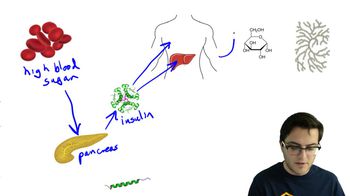Here are the essential concepts you must grasp in order to answer the question correctly.
Lysosomes
Lysosomes are membrane-bound organelles that contain digestive enzymes responsible for breaking down waste materials and cellular debris. They play a crucial role in cellular metabolism and the recycling of cellular components. Cells with high levels of metabolic activity or those that frequently engage in phagocytosis, such as immune cells, typically have more lysosomes.
Recommended video:
Pancreatic Cells
Pancreatic cells, particularly acinar cells, are specialized for producing and secreting digestive enzymes into the small intestine. These cells are involved in the breakdown of carbohydrates, proteins, and fats, necessitating a high number of lysosomes to process and recycle the enzymes and cellular materials involved in digestion.
Recommended video:
Small Intestine and Pancreas
White Blood Cells
White blood cells, or leukocytes, are essential components of the immune system, tasked with identifying and eliminating pathogens. Certain types, like macrophages, are particularly rich in lysosomes, as they engulf and digest bacteria and other foreign materials, requiring a significant number of lysosomes to manage the breakdown of these substances.
Recommended video:
 Verified step by step guidance
Verified step by step guidance Verified video answer for a similar problem:
Verified video answer for a similar problem:



 5:38m
5:38m